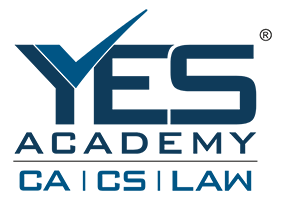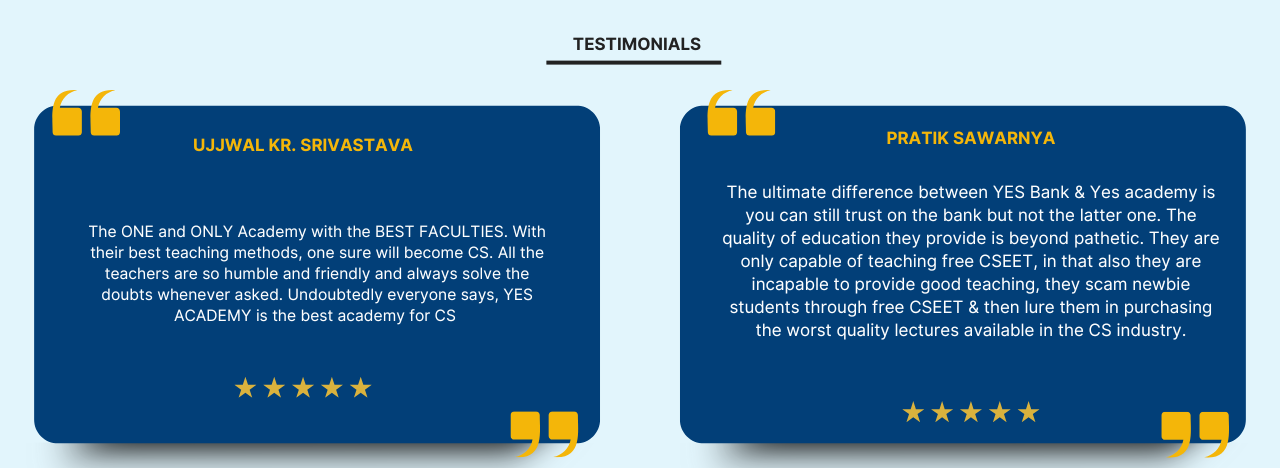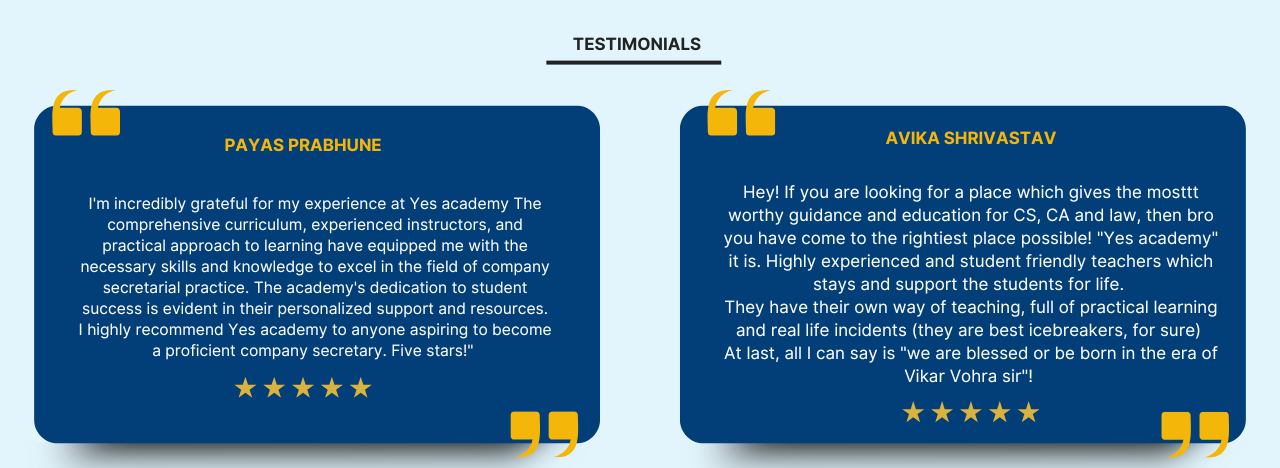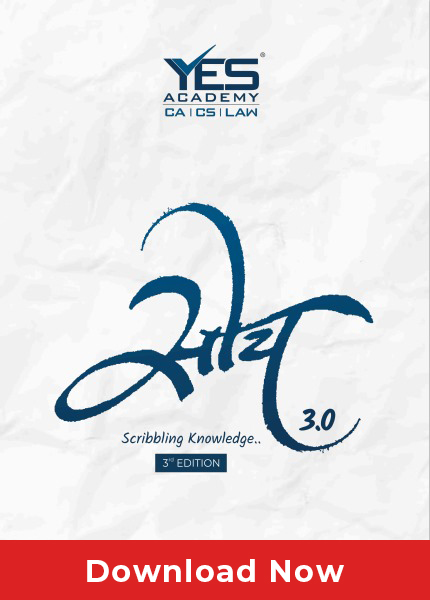Blog posts of '2023' 'June'
Well, the good news is Mathematics is not compulsory for becoming a QUALIFIED company secretary. However, it is highly beneficial if one has a strong foundation in maths to excel in any field. While CS primarily deals with legal and administrative aspects of corporate governance, maths plays a significant role in various areas of their work. In the following words, Let me break it down for you in a quick manner:
I will first put forward the uses of mathematics in the Corporate world:
Financial Analysis and Reporting: CS is involved in financial analysis and reporting. They have to understand financial statements analyse data, and interpret financial ratios. Mathematics. A solid understanding of mathematics is good for a CS to communicate financial insights to stakeholders effectively.
Compliance and Regulatory Framework: Only a CS is responsible for ensuring compliance with various laws and regulations. While maths may not be directly involved in compliance activities, it helps comprehend numerical thresholds, calculate penalties, and understand quantitative aspects related to compliance obligations.
Corporate Finance: Maths plays a crucial role in corporate finance, and CS frequently collaborates with finance teams on matters such as capital structure, investments, and valuation. Proficiency in mathematics enables CS to assess financial viability, analyse investment proposals, and contribute effectively to strategic decision-making.
Risk Management: Maths is an integral part of risk management, a vital aspect of a CS role. They need to assess and manage various financial, legal, operational, and reputational risks.
Corporate Governance and Board Support: CS is responsible for facilitating board meetings, maintaining records, and ensuring compliance with corporate governance standards. Maths helps organise and analyse data, prepare reports, and maintain accurate records.
CAN I TAKE CS WITH BASIC MATHS?
Absolutely Yes!! You do not have to come from a Commerce or any mathematics-based field to pursue CS. That's The Beauty of CS course. However, it is good for a student if he belongs to a Commerce background or has little knowledge about commerce subjects. So here's the deal: when pursuing a Company Secretary qualification, having a strong foundation in basic maths can be super helpful. While CS doesn't heavily focus on complex mathematical concepts like calculus or trigonometry, it does involve a fair amount of number crunching.
Don't stress too much if you are not a math whiz. Basic maths skills like arithmetic, percentages, and ratios should be more than sufficient to handle the mathematical aspects of the CS course. You'll deal with financial statements, analyse data, and understand key financial concepts. It's like doing some accounting stuff, you know?
CS isn't all about numbers. It also covers various subjects like law, corporate governance, business management, and ethics. So, think only a little if you're more into legal and corporate stuff. You should be good to go as long as you have a decent grasp of basic maths.
CAN I DO CS AFTER 12TH COMMERCE WITHOUT MATHS?
Dude! I am a Qualified CS Professional, and once a CS student can tell you, mathematics is never a requirement to become a qualified CS. You can pursue a CS course after completing your 12th in the commerce stream, even if you didn't take maths. Maths is not a mandatory requirement for CS.
The CS course primarily focuses on law, finance, accounting, economics, and corporate governance. While having a strong foundation in maths can help you understand certain financial concepts, it's not a strict prerequisite.
Now, remember that CS involves some numerical aspects, like Financial Management and interpreting financial statements. Don't let that discourage you! You can handle the number game with a little extra effort and a positive mindset.
IS THERE MATHS IN CS FOUNDATION/CSEET?
CS Foundation had a subject related to Mathematics, but CS Foundation no longer exists. It has been replaced by CSEET, which has no maths-related subjects.
At the Foundation/CSEET level, you'll encounter subjects like Business Communication, Legal Aptitude, Logical Reasoning and Economic and Business Environment. While these subjects don't heavily emphasise complex mathematical concepts, some numerical aspects are involved.
You'll come across basic arithmetic, percentages, ratios, and a touch of basic algebra. It's more about applying these concepts to practical scenarios rather than diving deep into advanced math theories.
The idea behind including some math in the Foundation/CSEET is to ensure aspiring Company Secretaries have a well-rounded understanding of business and financial concepts.
Don't sweat it! Suppose you're not a math enthusiast, with a little effort and some practice. In that case, you can handle the mathematical aspects of the Foundation/CSEET. There are plenty of study materials and resources available to help you out.
So, while there is a sprinkle of math in the Foundation/CSEET, it's nothing you can't handle, my friend. Just keep your chill vibes intact, put in the work, and rock that Company Secretary journey! You got this!
WHAT ARE THE SUBJECT IN CS?
The New Syllabus (2022) shall comprise an Online Company Secretary Executive Entrance Test (CSEET) consisting of Four (4) parts, Seven (7) Papers in the Executive Programme and Seven (7) Papers in the Professional Programme, including Two Papers as elective papers. The vocabulary of CSEET, Seven (7) Papers of the Executive Programme and Seven (7) Papers of the Professional Programme, including electives under the ICSI Syllabus (2022), are as under:
- The Syllabus of the Company Secretary Executive Entrance Test (CSEET) comprises the following four parts:
1. Part 1: Business Communication (50 Marks)
2. Part 2: Legal Aptitude, Logical Reasoning and Quantitative Aptitude (70 Marks)
3. Part 3: Economic and Business Environment (50 Marks)
4. Part 4: Current Affairs (30 Marks)
- CS Executive Programme: It shall consist of 7 subjects divided into two groups as follows:
Group A:
- Jurisprudence, Interpretation & General Laws (100 Marks)
- Company Law & Practice
Part I – Company Law – Principles and Concepts (60 Marks)
Part II – Company Administration & Meetings (40 Marks)
- Setting Up of Business, Industrial & Labour Laws
Part I – Setting Up of Business(60 Marks)
Part II – Industrial & Labour Laws (40 Marks)
- Corporate Accounting and Financial Management
Part I – Corporate Accounting (60 Marks)
Part II – Financial Management (40 Marks)
Group B:
- Capital Market & Securities Laws
Part I – Capital Market (40 Marks)
Part II – Securities Laws (60 Marks)
- Economic, Commercial and Intellectual Property Laws
Part I – Economic & Commercial Laws (60 Marks)
Part II – Intellectual Property Laws (40 Marks)
- Tax Laws & Practice
Part I - Direct Tax (60 Marks)
Part II - Indirect Tax (40 Marks)
- CS Professional Programme: Again, It shall consist of 7 subjects divided into two groups:
Group A:
- Environmental, Social and Governance (ESG) – Principles & Practice
Part I – Governance and Sustainability (65 Marks)
Part II – Risk Management (20 Marks)
Part III- Environment & Sustainability Reporting (15 Marks)
- Drafting, Pleadings and Appearances
Part I - Drafting and Conveyancing (70 Marks)
Part II - Pleadings and Appearances (30 Marks)
- Compliance Management, Audit & Due Diligence
Part I – Compliance Management (40 Marks)
Part II – Audit & Due Diligence (60 Marks)
- Elective *1 (Select one Paper out of 4 Elective Papers)
- CSR & Social Governance
Part I – Corporate Social Responsibility (50 Marks)
Part II – Social Governance (50 Marks)
- Internal and Forensic Audit
Part I – Internal Audit (60 Marks)
Part II – Forensic Audit (40 Marks)
- Intellectual Property Rights – Law & Practice (100 Marks)
- Artificial Intelligence, Data Analytics and Cyber Security – Laws & Practice
- Strategic Management & Corporate Finance
Part I – Strategic Management (40 Marks)
Part II – Corporate Finance (60 Marks)
- Corporate Restructuring, Valuation and Insolvency
Part I – Corporate Restructuring (40 Marks)
Part II – Valuation (20 Marks)
Part III – Insolvency, Liquidation & Winding-up (40 Marks)
- Elective 2 (Select one Paper out of 5 Elective Papers)
- Arbitration, Mediation & Conciliation
Part I – Arbitration & Conciliation (70 Marks)
Part II – Mediation (30 Marks)
- Goods and Services Tax (GST) & Corporate Tax Planning
Part I – Goods and Services Tax (GST) (70 Marks)
Part II – Corporate Tax Planning (30 Marks)
- Labour Laws & Practice (100 Marks)
- Banking & Insurance – Laws & Practice
Part I – Banking Laws (50 Marks)
Part II – Insurance Laws (50 Marks)
- Insolvency and Bankruptcy – Law & Practice (100 Marks)
This blog article has written by one of our students who has recently cleared her course.
Hello Readers! Are you looking to join CS or CMA, and you don't have any idea which course is right for you? So, You wanna choose between CS or CMA right? Well, Determining whether being a CS or a CMA is better depends on various factors, including your interests, skills, career goals, and the industry you wish to work in. Let's dive into the ocean and take a closer look at each profession:
Company Secretary:
A CS is responsible for ensuring that a company complies with legal and regulatory requirements. Their main focus is on corporate governance, board meetings, compliance with company law, and maintaining statutory records. Here are some points to consider:
-
Education: In order to become a CS, the student has to clear the CS exam offered by ICSI. ICSI is the statutory body established under an Act of Parliament and is responsible for regulating the profession of CS. The course has 3 levels namely, CSEET, Executive and Professional. The syllabus of CS is quite heavy and it requires consistent study.
-
Role: A CS acts as a bridge between the Board of a company and the outsider. He is responsible for all the legal and secretarial compliances of a company to operate under the regulatory framework of business in India. Moreover, He is defined and designated as a Key managerial Personnel in an organization.
-
Career Prospects: Many company secretaries work in the corporate sector, employed by public companies, private companies, or multinational corporations. They can hold positions such as
-
company secretary,
-
corporate governance officer,
-
compliance manager, or
-
legal advisor.
A CS with vast experience can also choose to start their own consultancy firms, and offer srvices in corporate governance, Secretarial, compliance, and legal advisory. Overall a CS has the scope of getting employed or to be into practice.
Cost and Management Accountant:
The CMA prepares individuals to become qualified professionals in the field of management accounting and strategic management. The primary governing body for this profession is the Institute of Cost Accountants of India which is also a statutory body estd. Udner an Act of Parliament and is responsible for regulating the profession. A CMA focuses on financial management within an organization. They provide valuable insights into cost control, budgeting, pricing strategies, and financial decision-making. Here are some points to consider:
-
Education: To become a qualified CMA, a student needs to get himself registed under the CMA course offered by ICAI. Similar to CS, CMA also has Three levels namely- Foundation, Intrmediate and Final. A student has to pass all the levels coupled with practical training to become a qualified CMA.
-
Role: The role of a CMA is to provide expertise in financial management and strategic decision-making within an organization. CMAs are responsible for analyzing financial data, conducting cost analysis, budgeting forecasting, and providing insights to support effective management decisions.
-
Career Prospect: Cost and Management Accountancy qualification opens up various career opportunities in India. Here are some potential career prospects for CMAs:
-
Management Accountant
-
Cost accountant
-
Financial Analyst
-
Cost Auditor
-
Consultant, and so on.
It is to be noted that CMAs are usually hired by manufacturing organisations because of their cost control aspects.
Here I will try to summerise the other important factors of both the courses ina tabular form:
|
Course |
CS |
CMA |
|
Levels |
|
|
|
Entry Route |
|
|
|
Practical Training |
Approx 2 Year |
18 months |
|
Attempts |
No Restriction |
No Restriction |
|
Subjects |
CSEET:
Executive
Professional:
*Disclaimer: The syllabus of the course may change from time to time. |
Foundation
Intermediate
Final:
*Disclaimer: The syllabus of the course may change from time to time. |
Ultimately, the choice between a CS and a CMA depends on your interests and strengths.
IS CS EASIER THAN CMA
Although It is hard to compare whether being a CS is easier or harder than being a CMA as the complexity and demands of each role can vary depending on individual and personal strengths.
Company Secretary Role:
Becoming a CS needs knowledge of corporate laws regulations, and governance practices. It involves managing legal and compliance aspects, maintaining statutory records, facilitating board meetings, and ensuring adherence to corporate governance principles. While the role does not involve financial analysis, it requires a strong understanding of legal frameworksl.
CMA Role:
Being a CMA involves expertise in cost and management accounting, financial analysis, budgeting, and strategic decision-making. CMAs focus on analyzing costs, improving cost efficiencies, budgeting and forecasting, and providing financial insights for effective decision-making. The role requires a strong foundation in accounting principles, financial management.
Now, lets compare the two:
Both the CS and CMA require dedicated study and commitment to succeed. The CS course places emphasis on company law legal compliance, and corporate governance. It involves an in-depth understanding of legal frameworks and requires attention to detail in maintaining statutory records and facilitating board meetings.
Whereas, CMA focuses on cst and management accounting, financial analysis, budgeting, and strategic decision-making. It requires a strong foundation in accounting principles, cost analysis techniques, and financial management concepts.
Its worth noting that both require practical training in their respective fields.
Therefre, in conclusion the difficulty of the courses can vary depending on individual aptitude, prior knowledge, and personal interest.
*Visit ICMAI website:ICMAI
*Visit ICSI website:ICSI
WHICH IS MORE VALUABLE, CS OR CMA?
So, when it comes to deciding which role is more valuable between the two professions, its like comparing apples and oranges. Both bring their unique flavor to the table and their value depends on what an organization needs..
Here are some factors to be taken into account while determining the value:
-
CS professionals are sought after for roles in company administration, compliance management, and legal advisory. On the other hand, the CMAs are highly regarded in industries that require expertise in cost analysis, budgeting, and financial management. CMAs are valued in sectors like manufacturing, retail, consulting, and services, where they can contribute to cost control, financial analysis, and strategic decision-making.
-
Both qualifications have global recognition, although the extent may vary. The CS qualification is widely recognized in India and in UK, US, Canada, Singapore as a Chartered Secretary while the CMA qualification offers international recognition, allowing professionals to pursue opportunities both within India and abroad.
-
The value of each Profession also depends on personal interests and skills. If you have a strong inclination towards legal compliance, corporate governance, and administrative functions, the CS qualification may be more valuable to you. Conversely, if you have a passion for financial analysis, cost management, and strategic decision-making, the CMA may be a better fit.
CS VS CMA. WHICH COURSE IS RIGHT FOR YOU?
Determining which course is right for you depends on several factors. Here are some considerations to help you make an informed decision:
-
Interests and Aptitude: Assess your interests and determine whether you are more inclined towards legal compliance and corporate governance or financial analysis and cost management .
-
Career Goals: Consider your long-term career goals and research the job market and growth prospects for CS and CMA professionals in your desired industry.
-
Skill Set: Evaluate your existing skills and determine which qualification will allow you to excel in your career.
-
Education and Background: Take into account your educational background and any prior experience that may align with CS or CMA
-
Personal Preference: Consider your personal preferences, values, and passion when choosing between CS and CMA.
CMA VS CS PASS PERCENTAGE?
For better understanding of the students, I will put below the pass percentage of both the courses.
|
Course |
Group |
*Passing percentage |
CS Executive |
Group I |
8.76% |
|
Group II |
18.12% |
|
CS Professional |
Group I |
22.07& |
|
Group II |
18.17% |
|
|
Group III |
18.90% |
*Pass percentages are according to the official press release of ICSI from June 2022 Examination.
|
Course |
Group |
*Passing percentage |
CMA Intermediate |
Group I |
19.10% |
|
Group II |
24.29% |
|
CMA FINAL |
Group I |
8.81% |
|
Group II |
17.77% |
*Pass percentages are according to the official press release of ICSI from June 2022 Examination.
WHO IS PAID MORE, CMA OR CS
The salary of a CMA and a CS varies depending on various factors such as the industry, experience, and the size of the organization. It is quite tough to provide an accurate comparison of the salaries between these two professions. But worry not, I can provide some general information on their earning potential.
CMAs are professionals who specialize in financial management and Cost planning within organizations. The salaries of CMAs varies widely depending on their experience and the industry they work in. Usually CMAs can earn competitive salaries, especially as they gain more experience and advance in their careers.
CS are professionals who ensure compliance with corporate governance, legal, and regulatory requirements. The salaries of CSs can also vary notably based on factors such as experience, industry, and obviously the size of the company. CS are employed by large corporations or multinational companies and often have higher earning potential compared to those working in smaller organizations.
In nutshell, though it is hard to answer the question, it can be said that both professions are paid well according to their knowledge.
CS VS CMA SALARY
So finally we have reached that section, for which every CS CMA aspirant eagerly waits to know the earning potential of both the Professions. Let's look into the salary earned by both the professionals in with holding different years of experience:
CS:
Fresher: The starting salary for a fresher CS can range from Rs. 3-5 lacs p.a.
Mid-level CS: With a few years of experience the salary for a mid-level CS can range from RS. 5-12 lacs p.a
Senior-level CS: Experienced CS in leadership roles or those working in large companies can earn salaries ranging from RS. 12-30 lacs p.a. Or maybe even more.
CMA:
Fresher: The salary for a fresher CMA can range from RS. 3-5 lacs p.a.
Mid level CMA: A mid level CMA having 2-5 years of experience can earn the salary of Rs. 5-12 lacs p.a.
Senior-level CMA: Experienced CMAs can earn salaries ranging from RS. 12-25 Lacs p.a. Or more.




